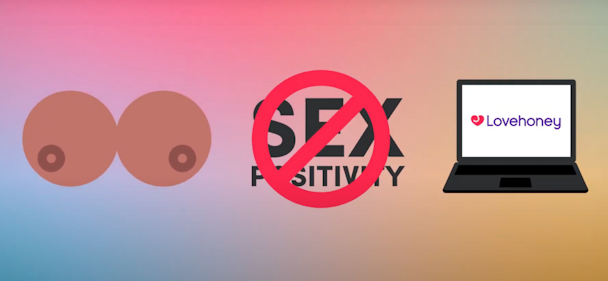‘We’ve lost 1 million customers’: Lovehoney talks SafeSearch, censorship and sales
Sexual wellness brand Lovehoney has been embroiled in a long-term conflict with Google and Instagram because stringent search and ad policies hinder its marketing efforts and hide its website. Lovehoney’s head of sexual empowerment Johanna Rief tells The Drum how it is fighting back.

Lovehoney’s ad educating people on how to turn off Google SafeSearch / Lovehoney
In 2021 Google made changes to its SafeSearch feature that, according to the corporation, “help filter out explicit content in search results.”
Due to this ‘explicit’ restriction, Lovehoney estimates that it has now lost close to 1 million customers. “It is just another example of big tech treating sexuality as something that is sinful,” says Rief, “while allowing other harmful content to slip through the net.”
In June this year, the brand decided to implement its struggle into its marketing message by creating a not-so-subtle billboard that called out the tech giant. ‘Ogle’ saw the recognizable primary colors of the Google search engine alongside the copy: “Turn off SafeSearch to lay eyes on our full range.”
To date, there’s been no response from the tech giant. “They don’t want to be mentioned in an article or be in the same room as sexual wellness brands,” adds Rief.
“We’ve made 600 complaints. We are in contact with the Google ads team, which is really nice, but the policy team doesn’t really want to talk to us.”
With Google being a top search engine, Lovehoney needs to make the arrangement work. It can’t boycott Google, but it needs to generate new traffic sources. “It was a little bit eye-opening for us. There are other search engines, right? They’re not as big as Google, but still relevant.”
Google is more than happy to accept Lovehoney’s ad spend, but it is restricted from retargeted ads. This, at least, Rief understands. Who wants to have sex toy ads show up on their work laptop on a Monday morning?
“We pay the same amount for Google ads, but we get less traffic,” she notes. “We were really sticking to the guidelines they gave us for ads, we said, ‘just tell us what we should do, what keywords we can bid on in order to make sure that we are aligned with the guidelines.’ We only want people on the homepage who are looking for these kinds of products. We’re not bidding on random keywords like toys.”
Generally, the feedback from Google is that the restrictions are in place to ‘protect kids,’ she says. But Rief is quick to point out that “as soon as a kid knows what sex toys are then they should be getting sex education.”
Regardless, for now, third-party sellers offer a lifeline, with the products offered on Amazon, Superdrug and Argos among other retailers. “Marketplaces are important, but even Amazon is a little bit strict when it comes to listing sex toys and where they are displayed,” she says.
“We’ve had our fair share of conversations with Amazon. It’s not super open-minded when it comes to sex toys, but we still sell quite well. And then there’s the affiliate program where they get a lot of money from selling sex toys. But again, it’s not Amazon’s favorite topic of conversation.”
But even social media has its issues. Lovehoney is silenced due to the terms of service. “Social media ads are not possible for us,” adds Rief. “Our followers and community are grown organically, which takes a long time and a lot of effort. We had times where [Instagram and Facebook] blocked our brands – they didn’t delete the channel, but they banned it for a while until we started being loud about it.”
With claims of being ‘shadowbanned,’ Rief says that Lovehoney was accused of violating the guidelines with its ads. She feels that the rules are so broad and that there are “definitely different standards for different topics.”
“It seems that female sexuality, within our society, was always oppressed or used to control women. You are not allowed to have the same sex drive. You are not allowed to have the same amount of sex partners. It was always used to keep women a little bit smaller. It seems that these big companies still have this outdated picture in mind when it comes to female sexuality.”
So when asked what’s next in the battle for a visible sex toy shop on the internet, Rief and co will continue garnering attention to the topic, creating a louder buzz. “Maybe a protest in front of the Google office?” teases Rief.
“I believe that many people working at Google have a way more open mindset than the ones [making the decisions].”

